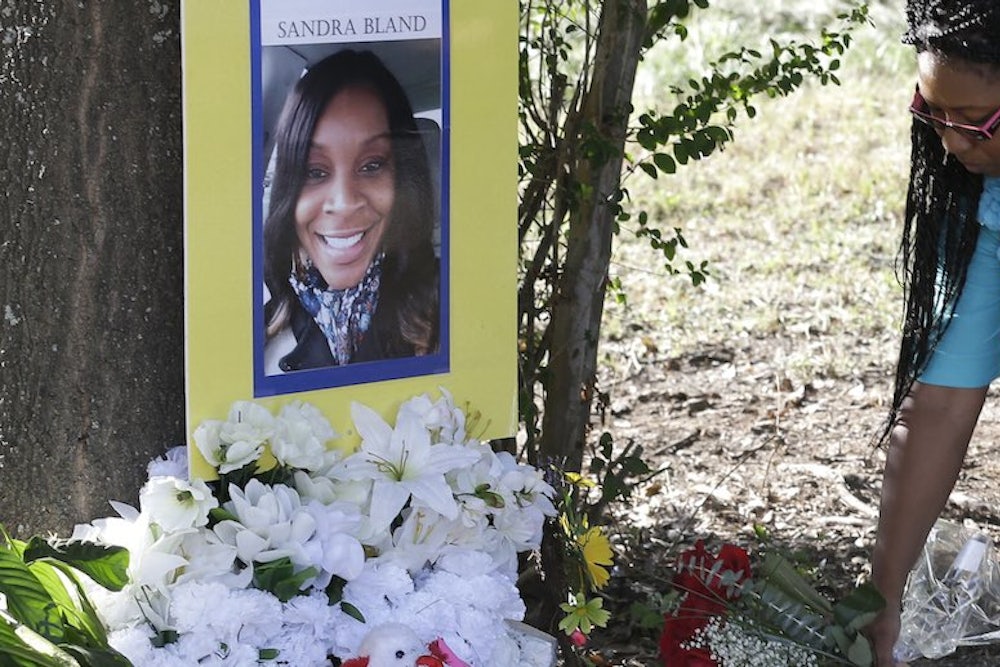As the trooper’s cruiser makes a U-turn and pulls up behind Sandra Bland’s white car, you can almost hear the first notes of John Williams’ Jaws theme. You then hear the first notes of the tuba that sounds like it’s underwater, and then the other horns. The pace quickens when the light turns green and she pulls through the intersection, driving in the left lane, the cruiser following close behind. Seconds later, Bland pulls into the right lane. The theme’s bass notes are now beating a steadier tempo in your head. You sense the threat, and it is more foreboding than usual, considering we know that Bland was found dead in a jail cell days later.
I have to wonder whether she took a look in her rear view mirror and thought of a shark. If you’ve ever been someone followed closely by a police car, especially if you’re driving while black, you can understand why she did that. The feeling that comes with a trailing officer, even when you know you’ve done nothing illegal, is palpable. It manifests in a cold sweat, the darting of eyes, or the sucking of teeth. Perhaps it’s what the police need to be effective, but for you, it’s just unnecessary. It’s something you seek to get rid of immediately. So much so, sometimes you don’t think to use your turn signal. You just need that shark to pass on by.
That’s how all of this began. We know that now because there is video that a bystander didn’t have to shoot: A video uploaded to YouTube on Tuesday by the Texas Department of Public Safety (DPS) that shows a little more than 52 minutes of trooper Brian Encinia’s dashcam from July 10. Its release comes on the heels of the Waller County district attorney declaring that it’s much too soon to accept the initial conclusion of suicide, and that Bland’s alleged hanging by plastic bag is being treated as a homicide.
“This team of investigators is committed to conducting a thorough and impartial investigation,” said DPS director Steven McCraw in a statement that accompanied the YouTube release. “When the Texas Rangers and FBI investigation is complete, it will be turned over for review by the District Attorney, who has indicated it will also be brought before a grand jury.”
There’s nothing in the Department’s press release that indicates that it’s anything less than the full arrest, though it’s hard to argue with journalist Ben Norton’s report that the video was edited. (DPS is now looking into the allegation.) But you still see plenty. You see Bland’s car approached by the officer, and you hear the initial, cordial interaction. But the verbal conflict quickly escalates: Bland is disgusted that she’s been pulled over for a failure to signal; the 28-year-old Chicago native tells Encinia, who has been a state trooper for just about a year, that she was moving to get out of his way. When she refuses to extinguish a cigarette, the trooper demands she get out of the car. When she says, “I’m in my own car. I don’t have to put out my cigarette,” Encinia points a Taser at her and says, “I will light you up.” (As the New York Times notes, neither the Taser nor the bit about the cigarette was mentioned in Trooper Encinia’s incident report.) She gets out, and it isn’t long until the conflict escalates into the abuse we’d already seen on a bystander’s mobile phone video. In the dashcam video, you hear her demand at least 14 times to know why she is being detained. She never receives a straight answer, beyond being told that she’s resisting the arrest that, as the DPS investigation revealed, violated the agency’s procedures. “I can’t wait until we go to court,” she can be heard saying. One of two things later happened in that jail: Bland was later murdered, or—more unlikely—her already damaged spirit, buoyed by the prospect of a new job, was broken to the point of suicide.
In the year since Eric Garner was put in a chokehold, and with every subsequent black death, we’ve become increasingly aware that melanin can get you killed, just because. But perhaps Bland, through her legal defiance and subsequent abuse, has reminded us that it isn’t just skin color that makes us dangerous to the law enforcement officers who seek to reinforce white supremacy or to exercise the privilege society grants them to brutalize your black ass. No, an African American woman who knows her rights as a citizen may be what most scares cops like those. Attitude and disgust with her mistreatment was treated like a criminal offense. She refused to accept the framework that Encinia was living under and all the while, did nothing unlawful in her interactions with him. But that doesn’t matter in an America where knowing your rights means little when they can be revoked at the whim of an officer’s temper.
